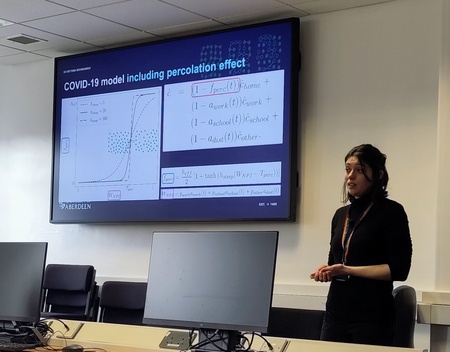On Wednesday January 31st, Dr Caroline Franco gave a talk on her modelling work during COVID-19, as part of the Interdisciplinary Seminar Series organised by the Department of Physics.
The talk kicked off with an overview of the use of modelling during the emergence of COVID-19. Mathematical models became important tools to support healthcare decision making, with the impact of different interventions and control strategies being assessed by these models. Caroline described her collaboration with the Observatório COVID-19 BR and the COVID-19 Modelling (CoMo) Consortium, that aimed to develop mathematical models to inform policy making in Brazil and other countries.
Caroline explained that compartmental modelling has its own advantages and challenges: while this type of model is suitable for simulation of large populations, the underlying well-mixing assumptions might be problematic, for instance, when considering non-pharmaceutical interventions which strongly affect individual behaviour. She described a study she conducted that addressed this issue by including a “percolation effect”, which you can read here: Percolation across households in mechanistic models of non-pharmaceutical interventions in SARS-CoV-2 disease dynamics
A key message from the talk was that to ensure the impact of modelling in evidence-based decisions, effective communication with all stakeholders and the use of participatory approaches is hugely important. Caroline concluded her talk by describing next steps towards pandemic preparedness and evidence-based decision making.
Caroline is a core member of the newly formed interdisciplinary “Dynamic Modelling for Healthcare” research group, that aims to use modelling to address challenges in complex healthcare systems, including demand and capacity planning, and analysis of infectious diseases. Researchers with an interest in modelling and machine learning, as well as stakeholder engagement and communication of complex mathematical concepts, are welcome to join the group. Please get in touch with Caroline to find out more.
Related references:
Participatory modelling paper (CoMo) consortium:
Other models from Observatório COVID-19 BR:
https://www.nature.com/articles/s43856-021-00048-6
https://journals.plos.org/ploscompbiol/article?id=10.1371/journal.pcbi.1009978
https://www.sciencedirect.com/science/article/pii/S2590113322000244


